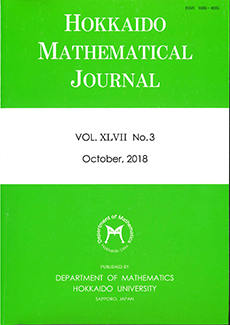François CASTELLA, Aurélien KLAK
Hokkaido Math. J. 43 (3), 275-325, (October 2014) DOI: 10.14492/hokmj/1416837568

KEYWORDS: High-frequency Helmholtz equation, Radiation condition at infinity, pseudodifferential operator, stationary phase theorem, 35Qxx, 35J10, 81Q20
We consider the high frequency Helmholtz equation with a variable refraction index n2(x) (x ∈ ℝd), supplemented with a given high frequency source term supported near the origin x = 0. A small absorption parameter αε > 0 is added, which prescribes a radiation condition at infinity for the considered Helmholtz equation. The semi-classical parameter is ε > 0. We let ε and αε go to zero simultaneously. We study the question whether the prescribed radiation condition at infinity is satisfied uniformly along the asymptotic process ε Ⅺ 0.
This question has been previously studied by the first autor in [4], where it is proved that the radiation condition is indeed satisfied uniformly in ε, provided the refraction index satisfies a specific non-refocusing condition. The non-refocusing condition requires, in essence, that the rays of geometric optics naturally associated with the high-frequency Helmholtz operator, and that are sent from the origin x = 0 at time t = 0, should not refocus at some later time t > 0 near the origin again.
In the present text we show the optimality of the above mentioned non-refocusing condition. We exhibit a refraction index which does refocus the rays of geometric optics sent from the origin near the origin again, and we show that the limiting solution does not satisfy the natural radiation condition at infinity in that case.

